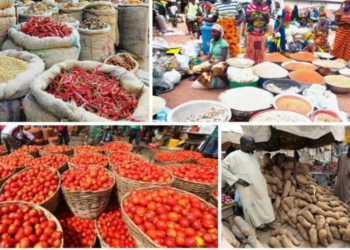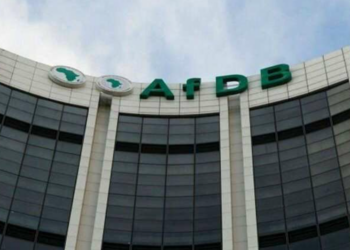In 2015, the Central Bank of Nigeria (CBN) released a list of 41 items prohibited from being imported into Nigeria with FOREX sourced from the CBN. The intent of the policy was simple – the CBN was seeking to utilize the FOREX (FX) market to support the import substitution policies of the FGN.
The 41 banned items included commodities such as rice, tomato paste, cement, meat, eggs and private jets. Milk has also been added to this list. If importers cannot access CBN FX, they will have to buy foreign exchange from the parallel market at a higher price. The CBN hopes the higher prices on imported food will make them too expensive for the Nigerian market. This will then incentivize the food importers to restrategize their operations and begin local production in Nigeria and avoid expensive FX for imports.
[READ MORE: CBN clears air on Diaspora Remittances, official inflows $2.6bn not $26bn]

The President of Nigeria further “directed” the CBN to cease providing dollars to importers. In essence, Nigeria does not want to subsidize food imports.
There are three problems with this.
- local food costs will rise;
- local food supply is inadequate; and
- monetary policies alone cannot fix this.
To be clear, imports for final consumption tend to be economically bad. Imports weaken the local currency. When a nation imports, she sells her currency and buys the currency of the exporter nation, thus the local currency loses value and falls. Imports also kill local jobs. The President and the CBN are not wrong in principle but they are attempting to cure an economy generating less than 5000mw for 190 million people with FX bans.
An FX ban works where the local market can meet local demand but cannot operate at maximum capacity because imports are cheaper and gain market share from local producers. A forex ban makes those imports more expensive, thus allowing local products to regain market share.
If local supply cannot meet local demand as in the case of rice and milk, then a forex ban simply raises food inflation because those imports of essential stable food items will still come in but at a higher price. A policy that simply increases the prices of local products is an incomplete policy.
Nigeria used to be a massive importer of cement until President Obansanjo banned the importation of bulk cement. This led to local cement companies like Ashaka and WAPCO and a new entrant called Dangote Cement to invest to expand local cement capacity in Nigeria. Today, Nigeria manufactures all the cement she needs locally.

Success? Not quite.
Nigeria’s self-sufficiency in cement has come as at literally a high price. A World Bank report titled “breaking down barriers” published in June 2016 found that African cement prices are 183% higher than global prices, on average, a bag costs $9.57 per 50kg bag compared with $3.25 globally. The question to ask is if a strategy that creates local jobs for cement and rice producers but increases costs in the entire economy is worth it. Food remains a major component of the inflation Consumer Price Index (CPI).
In 2015, Aliko Dangote set up a tomato processing plant in Kano to process approximately 900,000 tons of tomatoes produced locally in a bid to cut imports of about 300,000 tons imported yearly from China. The Dangote factory has not optimally operated continuously since inception, a key reason is that the local farmers could not meet the demand of the tomato factory, according to Abdulkareem Kaita, the Managing Director of Dangote Farms Ltd.
Hold on, we just read the total local production of tomatoes is more than local demand, Yes, but all those tomatoes have to be harvested, packed all over Northern Nigeria, and transported to Kano to the Dangote factory. In the absence of a functional cold chain or rails that can move bulk cargos, most tomatoes simply waste on account of bad rural roads. A ban on FX for tomato imports does not solve the problems Dangote Tomato factory is experiencing in Kano. Zero imports do not create local logistics or rural roads, the FX ban simply makes tomato import substitutes more expensive, raising food inflation.
What about Rice?
The US Department of Agriculture puts Nigeria’s demand as at 2018 at 7.3m metric tons, with local supply at 4.9m metric tonnes, clearly a deficit of 2.5m metric tonnes. With the FX ban and border closure, the price of locally-produced rice has moved from N13,500k to N16,500k, according to the Business Day newspapers. Basic economics says with higher demand, prices will rise, thus the CBN FX ban for rice importation has led to a rise in food inflation in Nigeria. Again, bans and tariffs only work when local supply can meet local demand.
Rather than forex bans, the CBN is better served by targeted subsidies to reduce local prices and eliminate food importation by making local food production cheaper in Nigeria.
[READ ALSO: CBN gives new directive to facilitate efficient payments system]

So what can the FGN and the CBN do?
- Subsidize local production.
- Give the local food companies a 90% rebate on cost of generated power. According to the Nigerian Labor Congress, “Between 30% and 35% of manufacturing costs are energy-related expenses”.
- Give food processors 0% interest loan from the CBN to build embedded power plants or pipelines to get gas to their factories.
- Give manufacturers direct allocation of diesel from NNPC based on food prices falling.
- Deploy gas flaring fees to fix rural roads.
- Build solar powered storage warehouses.
- If NNPC sells diesel to food processors in Nigeria at N20 a litre, it becomes harder for importers to bring in tomatoes grown in China, shipping, insurance paid & locally transport paid and beat local prices.
There are many other incentives that can be applied to drop the cost of production, that should be the priority.
Once costs fall, and productivity rises at Nigerian based food processors, local food will be more available and food inflation will reduce. The CBN is investing in direct lending to boost output, that is commendable, but it cannot do everything alone, this is a team play.





















